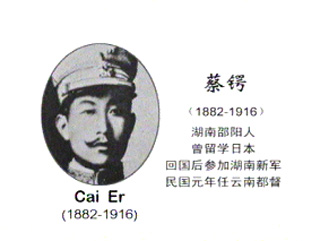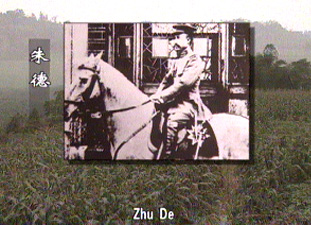 |
|
A Volatile World (5)
War of Protecting the Republic |
| CCTV.COM 2002-09-10 10:09:17 |
|
1916 was a year of the Dragon. People ushered in the year when the country had both a president and an emperor. Yuan Shikai ascended the throne on the first day of the year, and the title of his reign was Hongxian. Chinese character “Hong” was composed of two parts, meaning half the Qing Empire and half the Republic as being allegorized later. Beijing citizens didn’t see any ascending ceremony on that day. They talked more about a new round-the-city railway.
On the same day, something stirring happened in Kunming, a source of armed uprising against Yuan Shikai. Five-colored national flags were hung all over the city. Army men and civilians paraded in streets to celebrate the founding of the Republican Protection Army Government. The plotter was General Cai Er, a legendary figure.
 Cai Er had been a supporter of Yuan Shikai. In 1914, he gave up military power in Yunnan and came to Beijing, helping Yuan to deal with the military affairs. He hoped to reorganize the army. But Yuan was active in carrying out his plan to establish a monarchy. That shocked and awakened Cai. He sneaked to Tianjin, discussed with Liang Qichao, a teacher who opposed establishing a monarchy, and decided to hold an armed uprising against Yuan. Cai Er suddenly disappeared from Beijing. He shook off Yuan’s surveillance and secretly returned to Kunming via Vietnam. Cai Er had been a supporter of Yuan Shikai. In 1914, he gave up military power in Yunnan and came to Beijing, helping Yuan to deal with the military affairs. He hoped to reorganize the army. But Yuan was active in carrying out his plan to establish a monarchy. That shocked and awakened Cai. He sneaked to Tianjin, discussed with Liang Qichao, a teacher who opposed establishing a monarchy, and decided to hold an armed uprising against Yuan. Cai Er suddenly disappeared from Beijing. He shook off Yuan’s surveillance and secretly returned to Kunming via Vietnam.
Yunnan proclaimed its independence on December 25. Cai Er led the Republican Protection Army to go north to fight with the Yuan army. A great holy war in protection of the republic was officially unveiled.
Mianhuapo was a place in Yunnan. It was the only way to Sichuan. The Protection Army suffered a setback at this place in March of 1916. Zhu De, leader of the 3rd Detachment, led an army to reinforce it. The battle made him a noted general of the Yunnan Army. After 24 years, Zhu De became General Commander of the China Worker-Peasant Red Army.
 Not long after, Guizhou, Guangxi and Guangdong provinces proclaimed their independence one after another. Anti-Yuan forces quickly grew stronger. Not long after, Guizhou, Guangxi and Guangdong provinces proclaimed their independence one after another. Anti-Yuan forces quickly grew stronger.
Yuan Shikai pinned his hope on international support. But the information British envoy, John Newell Jordan, brought to him was that other countries were not in favor of a monarchy. So Yuan was forced to give order to the government institutions that the country was called National Republic to foreigners. Hongxian Monarchy was only used at home. That brought about a confused chronology and a ridiculous co-existence of a monarchy and a national republic.
What terrified Yuan most happened. Taking command of Nanjing defense, Feng Guozhang and other four generals of the Northern Warlords Army wrote a joint letter, asking Yuan to give up the monarchy to reassure the public. The betrayal of the troops under the direct control of Northern Warlords Army totally shattered Yuan’s dream. His family was in chaos.
Yuan Shikai had to cancel the monarchy when he saw the game was up. His dream of being an emperor had been materialized for 83 days before it was shattered.
Bank of China and Communications Bank found themselves in difficulties because of the great expense in military increase and preparing for establishing a monarchy. On May 13, the two banks stopped conversion in cash. Running on a bank suddenly became a tide. People lost their final illusion about the government.
|
|
Editor: Liu Baoyin CCTV.com
|
|
|
|
|
|
 |









